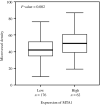MTA1 overexpression correlates significantly with tumor grade and angiogenesis in human breast cancers
- PMID: 16630134
- PMCID: PMC11159072
- DOI: 10.1111/j.1349-7006.2006.00186.x
MTA1 overexpression correlates significantly with tumor grade and angiogenesis in human breast cancers
Abstract
Metastasis associated antigen 1 (MTA1) is a recently identified candidate metastasis-associated gene that plays an important role in tumorigenesis and tumor aggressiveness, especially tumor invasiveness and metastasis. We analyzed the relationship between MTA1 expression and variable clinicopathological features and characterized its role in tumor angiogenesis in human breast cancers. Two hundred and sixty-three breast cancer cases that successfully underwent surgery at Hanyang University Hospital (Seoul, Korea) between January 1989 and December 1997 were enrolled. MTA1 expression was observed by immunohistochemical staining and correlated with intratumoral microvessel density (MVD) and other clinicopathological parameters. MTA1 overexpression correlated significantly with higher tumor grade (grades 1 and 2 vs grade 3, P = 0.009). However, MTA1 expression did not correlate with tumor stage, status of estrogen and progesterone receptors, or axillary lymph node metastasis. Interestingly, MTA1 expression was found to correlate significantly with tumor MVD (P = 0.002). Survival analysis did not show a significant difference between MTA1 overexpression and poorer survival. In conclusion, MTA1 overexpression was found to be closely associated with higher tumor grade and increased tumor angiogenesis. These findings suggest MTA1 as a predictor of aggressive phenotype and a possible target molecule for anti-angiogenic drugs in breast cancer treatment.
Figures




Similar articles
-
Metastasis-associated protein 1 nuclear expression is closely associated with tumor progression and angiogenesis in patients with esophageal squamous cell cancer.World J Surg. 2012 Mar;36(3):623-31. doi: 10.1007/s00268-011-1421-z. World J Surg. 2012. PMID: 22270988
-
Overexpression of metastasis-associated protein 1 is significantly correlated with tumor angiogenesis and poor survival in patients with early-stage non-small cell lung cancer.Ann Surg Oncol. 2011 Jul;18(7):2048-56. doi: 10.1245/s10434-010-1510-5. Epub 2011 Feb 3. Ann Surg Oncol. 2011. PMID: 21290196
-
Close association of metastasis-associated protein 1 overexpression with increased angiogenesis and poor survival in patients with histologically node-negative gastric cancer.World J Surg. 2013 Apr;37(4):792-8. doi: 10.1007/s00268-012-1898-0. World J Surg. 2013. PMID: 23283219
-
Prognostic significance of cyclin D1, β-catenin, and MTA1 in patients with invasive ductal carcinoma of the breast.Ann Surg Oncol. 2012 Dec;19(13):4129-39. doi: 10.1245/s10434-012-2541-x. Epub 2012 Aug 3. Ann Surg Oncol. 2012. PMID: 22864797
-
The role of the MTA family and their encoded proteins in human cancers: molecular functions and clinical implications.Clin Exp Metastasis. 2009;26(3):215-27. doi: 10.1007/s10585-008-9233-8. Epub 2008 Dec 31. Clin Exp Metastasis. 2009. PMID: 19116762 Review.
Cited by
-
Genomic profiling in locally advanced and inflammatory breast cancer and its link to DCE-MRI and overall survival.Int J Hyperthermia. 2015 Jun;31(4):386-95. doi: 10.3109/02656736.2015.1016557. Epub 2015 Mar 26. Int J Hyperthermia. 2015. PMID: 25811737 Free PMC article.
-
Metastasis-associated protein 1 (MTA1) is transferred by exosomes and contributes to the regulation of hypoxia and estrogen signaling in breast cancer cells.Cell Commun Signal. 2019 Feb 19;17(1):13. doi: 10.1186/s12964-019-0325-7. Cell Commun Signal. 2019. PMID: 30782165 Free PMC article.
-
Correlation of two distinct metastasis-associated proteins, MTA1 and S100A4, in angiogenesis for promoting tumor growth.Oncogene. 2019 Jun;38(24):4715-4728. doi: 10.1038/s41388-019-0748-z. Epub 2019 Feb 11. Oncogene. 2019. PMID: 30745574
-
MTA1--a stress response protein: a master regulator of gene expression and cancer cell behavior.Cancer Metastasis Rev. 2014 Dec;33(4):1001-9. doi: 10.1007/s10555-014-9525-1. Cancer Metastasis Rev. 2014. PMID: 25332145 Free PMC article. Review.
-
Expression and Prognostic Significance of Metastasis-Associated Protein 1 in Gastrointestinal Cancer.Front Oncol. 2020 Dec 21;10:542330. doi: 10.3389/fonc.2020.542330. eCollection 2020. Front Oncol. 2020. PMID: 33409150 Free PMC article.
References
-
- Parkin DM, Bray F, Ferlay J, Pisani P. Estimating the world cancer burden: Globocan 2000. Int J Cancer 2001; 94: 153–6. - PubMed
-
- Toh Y, Pencil SD, Nicolson GL. Analysis of the complete sequence of the novel metastasis‐associated candidate gene, mta1, differentially expressed in mammary adenocarcinoma and breast cancer cell lines. Gene 1995; 159: 97–104. - PubMed
-
- Toh Y, Pencil SD, Nicolson GL. A novel candidate metastasis‐associated gene, mta1, differentially expressed in highly metastatic mammary adenocarcinoma cell lines. cDNA cloning, expression, and protein analyses. J Biol Chem 1994; 269: 22 958–63. - PubMed
-
- Pencil SD, Toh Y, Nicolson GL. Candidate metastasis‐associated genes of the rat 13762NF mammary adenocarcinoma. Breast Cancer Res Treat 1993; 25: 165–74. - PubMed
-
- Bagheri‐Yarmand R, Talukder AH, Wang RA, Vadlamudi RK, Kumar R. Metastasis‐associated protein 1 deregulation causes inappropriate mammary gland development and tumorigenesis. Development 2004; 131: 3469–79. - PubMed
Publication types
MeSH terms
Substances
LinkOut - more resources
Full Text Sources
Other Literature Sources
Medical
Miscellaneous

